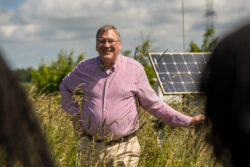Professor Steve Banwart

Colleagues will be sorry to learn of the death, on 30 December 2023, of Professor Steve Banwart, Director of the Global Food and Environment Institute and Dean for Global Development. The following tribute has been contributed by the Global Food and Environment Institute Executive Group.
To the many colleagues who worked with Steve throughout his career, he will be remembered, amongst other things, for his tireless efforts to promote positive societal and environmental change, the way that he advocated for junior colleagues, and his passion for working in partnerships globally and across disciplines. In this tribute to Steve, we look back at his career and trace the expertise, personal attributes and the principles that he sought to build into the fabric of the Global Food and Environment Institute when he founded it in 2017. The piece is interspersed with some personal reflections from close colleagues within the Institute.
Steve’s academic career was one of ever-expanding horizons. His studies and research began in laboratory-based geochemistry. Having completed a bachelors degree in civil engineering and an MSc in Environmental Engineering at the University of Iowa in the early 1980s he moved to Zurich to study for a PhD in Environmental Science at the Institute for Water Resources and Water Pollution Control at the Swiss Federal Institute of Technology. Under the supervision of the Institute’s former director Prof. Werner Stumm, he completed his PhD thesis on “The reductive dissolution of hematite by ascorbate”. He then joined the Royal Institute of Technology in Stockholm as a Post-Doctoral Research Assistant, and subsequently as a Research Fellow in the Department of Inorganic Chemistry.
Steve had been based in Yorkshire since 1995, firstly at the University of Bradford, before
moving to the University of Sheffield in 2001 and eventually coming to the University of Leeds in 2016. It was at Sheffield that Steve led the European Commission Framework 7 SoilTrEC from 2009 to 2014. It was a programme that brought together his training and expertise in soil science and his international networks and outlook, to establish a network of critical zone observatories across the European Union, US and China to observe and model ecosystem services and functions. Whilst at Sheffield, Steve served as Secretary of the European Association of Geochemistry from 2008 to 2012, was the academic lead for global engagement of the N8 Universities AgriFood programme, and also took on Directorship of the Kroto Research Institute. The purpose and ethos of the Kroto Institute was to bridge disciplines of molecular science, engineering and social science to tackle societal challenges and have a positive global impact.
Steve joined the University of Leeds as Professor and Integrating Leadership Chair in Soil, Agriculture and Water. During his initial years in this role, he led a NERC-funded programme on Using Critical Zone Science to Enhance Soil Fertility and Improve Ecosystem Services for Peri-Urban Agriculture in China, further strengthening the collaborations in China, particularly with Nanjing University and the Chinese Academy of Sciences. Steve was instrumental in establishing the University of Leeds’ joint PhD programme with Nanjing. He was also active in science diplomacy and helped to establish the UKRI-NSF China Newton Fund research programme on protecting the ecosystems services of soil and water resources.
When Steve founded the Global Food and Environment Institute at Leeds, his vision was that it would be a home for interdisciplinary food systems research, fostering collaboration across and beyond the University to promote food security, environmental sustainability and dietary health for all. He played a pivotal role in the development and management of the University Farm and believed that Leeds should host a highly connected digital agrifood campus for engagement, education and research on net zero agriculture. Steve championed multidisciplinary work, encouraging participation in GFEI from all Schools and Faculties across the University.
Through his role as Director of the Global Food and Environment Institute, Steve worked with global partner networks in Europe, Southern and Eastern Africa, East Asia and North and South America. He played a key role in the establishment of the University’s strategic partnerships with the University of Pretoria, and actively collaborated on programmes such as FSNet Africa, which provides mentorship and capacity building for early-career African academics.
His passion for international collaboration and partnership in Higher Education and research was reflected in his appointment in 2022 as the University’s Dean of Global Development. On taking up the role, Steve was quoted as saying: “It’s essential, given the challenges facing humanity, that universities such as ours do everything in their power to lead effective global partnerships. We must harness their world-changing research and high-quality education with practitioners to achieve a greater good that is far more equitable in its impact and reach.”
Throughout Steve’s career, he recognised the importance of people collaborating — across disciplines, across international borders, across professions and career stages. He worked tirelessly to enable collaborations, not just because he saw them as the key to addressing complex global challenges, but because of the value he placed on personal relationships and the genuine friendships that he created and that are so evident in the testimonies and tributes of those that he worked with.
As we do our best to take forward the vision that Steve had for the Global Food and Environment Institute, we recognise and are grateful for where, and with whom, it started.
Rest in Peace, Steve.
